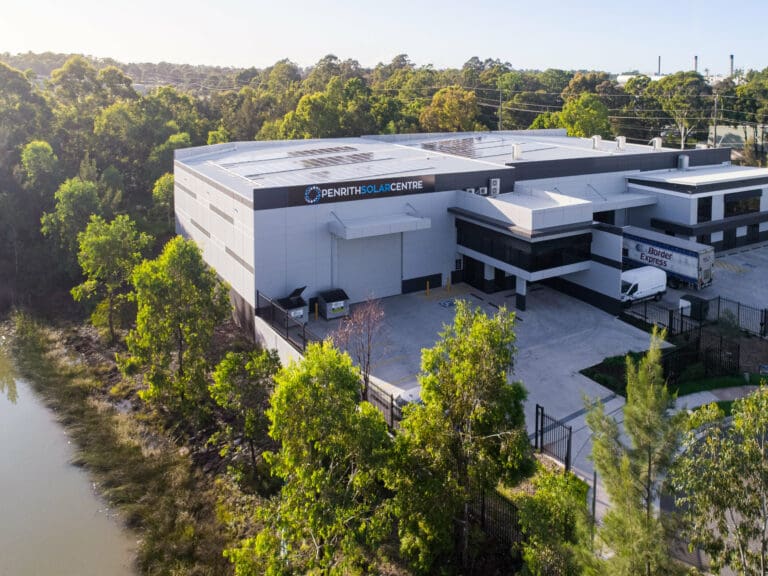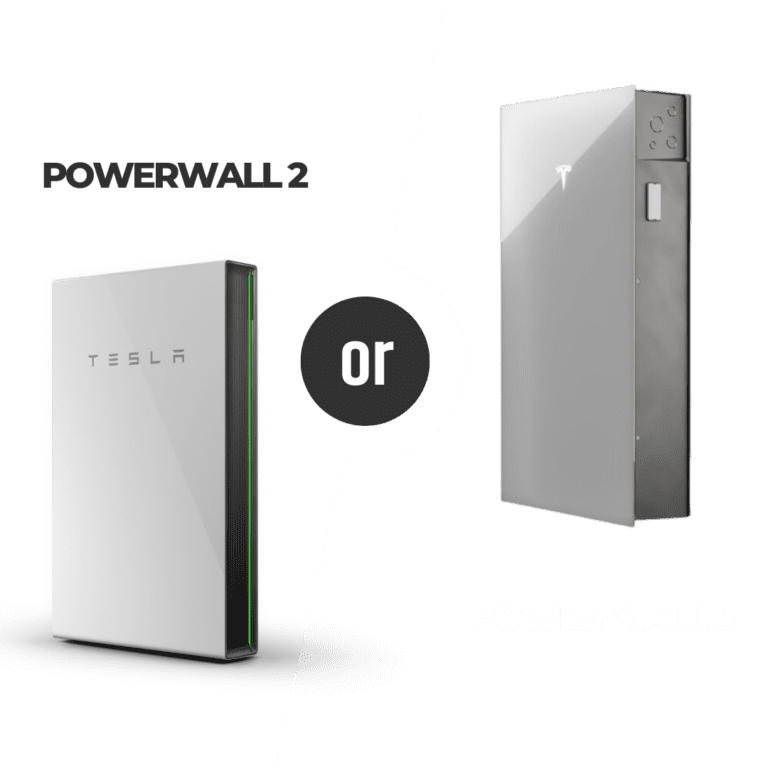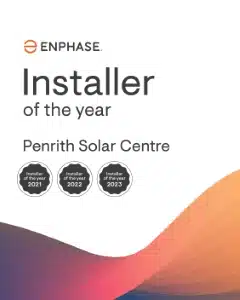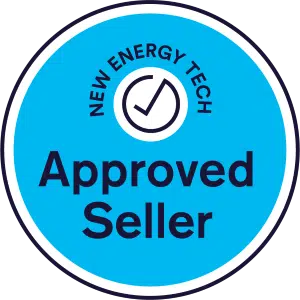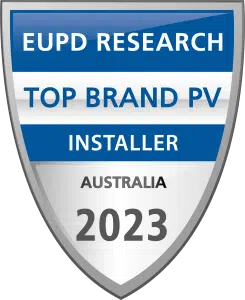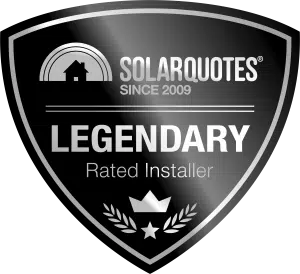Are you in the market for a solar battery? Are you adding one to an existing solar panel system? Maybe you’re just getting started with solar and you want to bundle a battery in with your panels?
There are dozens of solar batteries on the market. You might not know the difference between most of them when you’re starting out.
Regardless of where you might be on your solar battery research journey, you’ve found this review of the Enphase IQ Battery 5P. At Penrith Solar Centre, we take pride in educating customers so you can make the best choice for your unique solar needs.
We have installed thousands of batteries in the Sydney metro area and beyond. We carry the Enphase IQ Battery 5P because we believe it is one of the best batteries on the market for new and existing solar arrays.
That being said, this review is going to be an honest examination of the Enphase IQ Battery 5P. You’ll read about its specs and features, some pros and cons to consider, and hopefully, by the end of this review, you’ll be able to determine whether it’s in alignment with your energy consumption patterns.
To be crystal clear, the Enphase IQ Battery 5p is not for everyone. There are solar needs that require a different energy storage solution. This article will address those situations.
A solar system is an investment in your property that lowers your electric bills and saves you money over time. You want the best bang for your buck, and understanding whether this model is right for you will empower you as a customer.
In this article you will discover:
- What is an Enphase IQ Battery 5P?
- What Are the Specs and Features of the IQ Battery?
- What are the Pros and Cons of the IQ Battery?
- Is the IQ Battery a Good or Bad Fit for Your Solar System?
- The Final Verdict: Is the Enphase IQ Battery 5P Right for You?
By the end of this article, you will have an unbiased understanding of what an Enphase IQ Battery 5P is and can do.
What is an Enphase IQ Battery 5P?
Enphase Energy, an American company known for its microinverter technology, released the Enphase IQ Battery 5P a few years ago in North America. It’s finally come to Australia! It’s an all-in-one AC-coupled battery that uses microinverter technology inside the battery to ensure efficiency.
An AC-coupled solar system is defined by how it converts DC to AC electricity. An AC-coupled system converts the electricity gathered by the solar panels from DC power to AC power in a microinverter mounted underneath the solar panel.
Once converted, that power is then sent to the AC-coupled battery where it’s reconverted again back to DC electricity for storage at a later time. That AC-coupled battery also converts the energy back to AC power for when it’s directed to send it to the house or the grid.
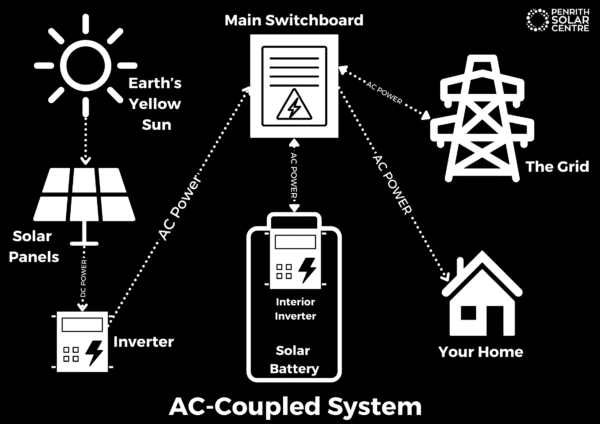
If that sounds like a lot of converting, well, it is. AC-coupled batteries in general are more compatible with older solar panel designs which is a big reason why they’re so popular.
Enphase’s IQ Battery 5P is unique because it has six 680W microinverters inside of it that give it a higher charge and discharge rate than its competitors. The charge and discharge rates are the speed at which power is sucked in to or sent out from the battery.
The continuous power rating of 3.84kW — during normal operation — refers to the amount of electricity discharged (released) for a longer, consistent period of time. It can release this electricity uninterrupted for as long as it needs to or until it runs out of juice.
In the case of this battery, it can discharge power at a rate of 7.68kW at its peak. So that’s the highest amount of electricity that can be released over a short period of time. It’s like a sprint. This battery can meet high-demand situations efficiently, but this will drain the battery much faster than normal operation.
Those microinverters in the battery are IQ8D-BAT microinverters. The distributed architecture of using six microinverters inside the battery works like this: if one microinverter in the battery fails, you still have over 80% of your total battery charge and discharge rate until that microinverter is replaced under warranty. They work together to keep the lights on if one fails.
The Enphase IQ Battery 5P is made from lithium iron phosphate, which is slightly different from other lithium-ion batteries. They’re cobalt-free, making them environmentally friendly, and can operate at high temperatures, which reduces the risk of fire.
If you’re interested in learning a bit more about IQ Batteries, you might want to check out the following article titled, Enphase IQ Battery 5P Review.
What Are the Specs and Features?
These numbers are straight from Enphase’s website:
- Continuous power rating: 3.84kW
- Peak power rating: 7.68kW
- Energy capacity: 5.0kWh
- Round-trip efficiency: DC in is 96% and AC out is 90%
- Dimensions: 188 mm x 550 mm x 980 mm
- Weight: 66.3 kg
Okay, now what does all that information from the manufacturer’s website mean?
First, you need to understand the difference between energy and power. Think of it like water (but never combine electricity with water). The water flowing through a hose behaves differently than the water stored in a bucket. Power is a measurement of the water flowing through the hose and energy is the measurement of the water stored in a bucket.
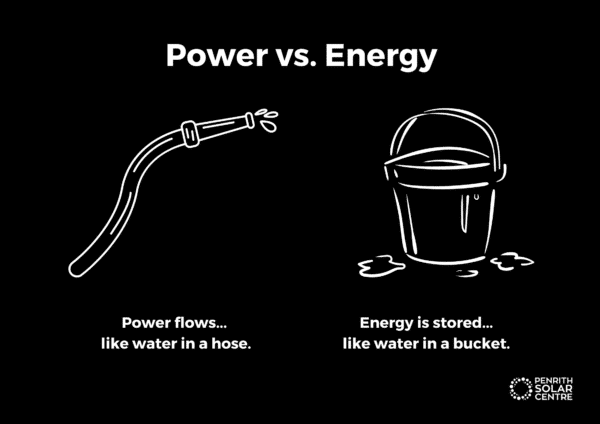
The round-trip efficiency is best explained in layman’s terms: if you put 100 units of energy into the battery during charging and can retrieve 90 units of energy when you discharge it, the round-trip efficiency would be 90%. The remaining 10 units were lost as heat or due to various electrical losses during the charging and discharging process.
Some additional features of the Enphase IQ Battery 5P are:
- It cools passively with no moving parts or fans, so it’s quiet.
- The microinverters and other components are plug-and-play, making installation easier and faster which saves you money.
- The Enphase App gives you comprehensive remote monitoring and control of your solar system.
- The battery has a backup mode, a self-consumption mode, and a time-of-use mode. All of which are fully programable.
If you’re interested in learning a bit more about how to get the most out of your solar system with the Enphase App, you might want to check out the following article titled, What is Consumption Monitoring?
Discover your solar potential now
What Are the Pros and Cons of This Battery?
Like any product on the market, the Enphase IQ Battery 5P has advantages and disadvantages. Here are some pros and cons. We’ll get into how they apply to you in the next section.
Pros:
Stackable: The Enphase IQ batteries are stackable. Which is a solar industry term that means you can connect them to get more storage. A 5kWh battery “stacked” with another 5kWh battery will give you a 10kWh system. Twice the storage capacity.
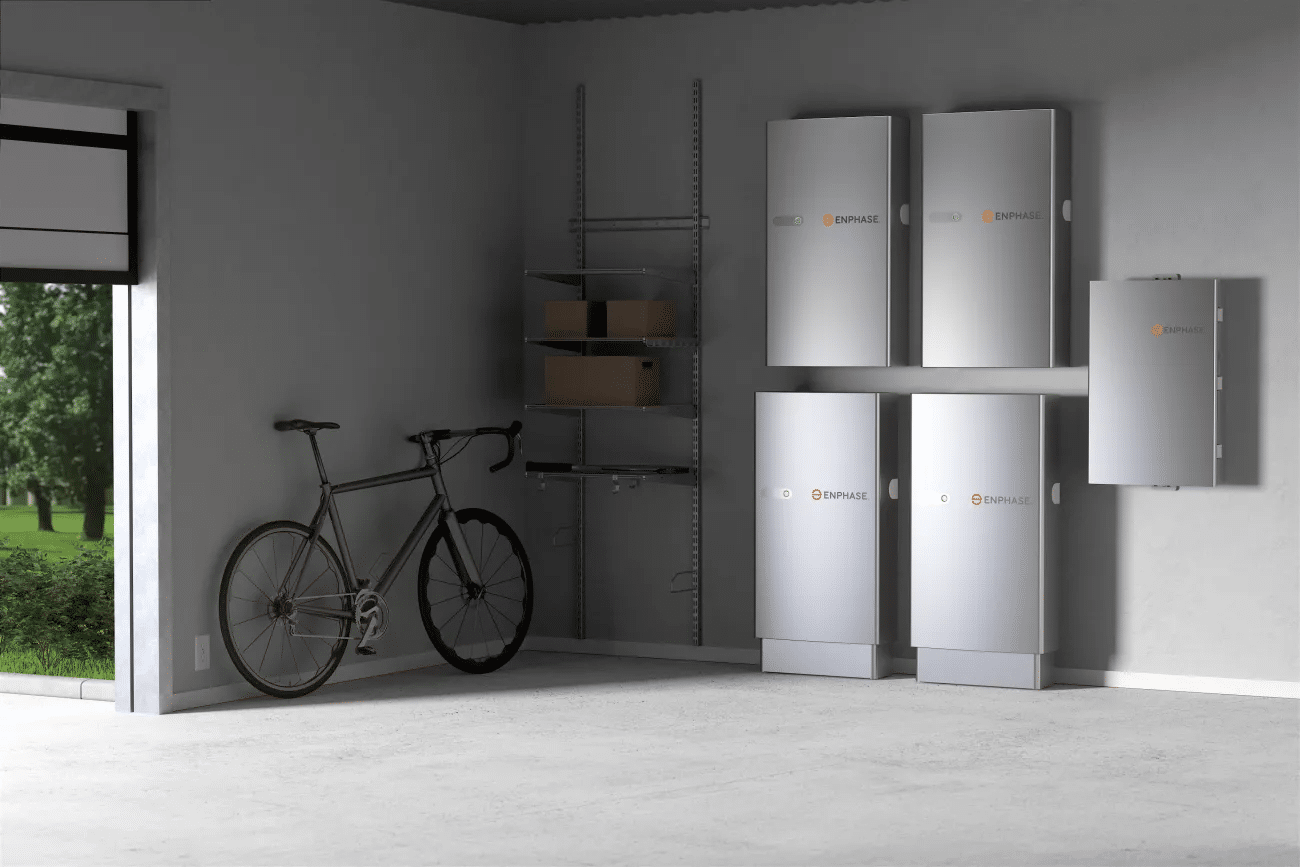
Enphase IQ batteries give you a more exact and specific storage capacity than other batteries. Most other batteries offer 10kWh of storage, which is bigger — and bigger is better, right?
Targeting Needs: Well, not always. When you get into bigger systems, you might only need 15kWh of storage. With two Tesla Powerwalls, you’re installing 27kWh whether you need that capacity or not. Three Enphase batteries will help you zone in on your exact needs with the ability to upgrade more IQ Batteries if your needs increase.
However, it should be noted that the Tesla Powerwall 2 is one of the best values in solar batteries per kWh. So while Enphase might help zero in on a specific storage capacity for 15kWh and above, it’s a better bang for your buck to get a Powerwall if you’re looking for 13.5kWh or less.
Blackout Protection: The backup system is designed to handle the transfer from grid to off-grid seamlessly. The IQ System Controller, which is designed for installation with your battery, connects your home, the grid, and your battery to work together when the grid goes down. The backup turnover from the grid to the battery doesn’t so much as flicker.
Decentralised: The six microinverters located inside the Enphase IQ Battery 5P are unlike anything else on the market. In other AC-coupled batteries like the Tesla Powerwall, if the inverter in the battery dies, the entire battery is dead and needs to be replaced. With Enphase, you just replace one of the microinverters.
The microinverters in the Enphase battery are covered under warranty and shouldn’t cost anything to replace, where a Tesla Powerwall 2 that goes south, if it’s not covered under warranty, could cost you up to $15,000 to replace.
Enphase is a trusted company that’s in it for the long haul with great customer service. If you’re worried about getting that warranty fulfilled should anything go wrong within a couple of years, they’re there to help.
Speaking of the warranty, it’s the best warranty of any battery in solar. It covers 15 years or 6,000 cycles, whichever comes first. A cycle is the full powering up of a battery to full capacity and the complete depletion of all electricity in the battery. This usually happens daily in most homes, but that depends on your energy consumption patterns.
Cons:
Small: The downside of that 5kWh of storage is that it’s small. A lot of other batteries have a higher storage capacity, usually between 7 – 15kWh of storage. However, the cost per kWh is about the same as other batteries in its class.
Compatibility: It’s only compatible with Enphase systems and Enphase microinverters. You must upgrade your solar panels to Enphase microinverter solar panels if you want to use your Enphase battery.
Cost: Solar batteries are expensive upfront. When calculating the cost of your solar system, whether it has a battery or not, you must consider the long term savings as well. An IQ Battery’s payback period length depends on how you program it and use the free energy coming down from your panels.
Internet: A real disadvantage of Enphase systems, including the battery, is the need to be connected to the internet for self-consumption monitoring. Fortunately, it comes with an included sim card.
If you’re interested in learning a bit more about the IQ Battery and how it performs over time, you might want to check out the following article titled, What is the Lifespan of the Enphase IQ Battery 5P?
Is it a Good or Bad Fit for Your System?
Like most questions in the solar industry, the answer is: it depends.
Good Fit:
If you have an existing Enphase solar system, it’s designed to work with the Enphase IQ Battery 5P. If you’re interested in Enphase microinverters, it’s a good idea to bundle the battery when you install the panels for a better return on investment.
If you’re looking to start small because your needs are small or your budget is limited, Enphase IQ Battery 5P is a good jumping-off point. You can get a more exact storage solution for your energy needs with the option to upgrade it with another battery (or two) later.
The backup system is incredible. If you always need electricity available, if you’re running medical equipment or a security system, it seamlessly powers your home appliances when the grid goes down. The rapid switchover time is measured in milliseconds, that’s how fast it is. Your TV won’t ever flicker.
Bad Fit:
Microinverter Mismatching: If your solar installer has mixed and matched models of Enphase microinverters on your solar panels, an Enphase battery will not work. One of the great advantages of a microinverter system is that it’s easily expandable; you can add more panels to the system if your needs change. If your solar panels have IQ7 Series Microinverters on them, then you need to add more IQ7 Series Microinverters when you add more solar panels.

If your installer puts IQ8 Series Microinverters on the new solar panels when the IQ7 Series is already installed on existing ones, the microinverters will have trouble speaking to each other and then the battery.
The Enphase battery has IQ8 Series Microinverters inside of it already, which we discussed above.
The IQ Controller monitors electricity moving between the panels on the roof and the battery. It can’t connect two different types of microinverters on the roof with the type of microinverters in the battery.
So if you’ve got different models of microinverters mixed on the solar panels after an upgrade, you have a choice to make: have the IQ7 panels or the IQ8 panels feed the battery, it can’t read both. You’ll want to go with whichever panel array outputs the most power. A good installer should know about this and be able to explain this to you.
Moving: If you’re looking for a quick return on investment, then you probably shouldn’t bother with an Enphase battery (or a microinverter system when it comes to that). Microinverters and IQ Batteries cost more upfront, but save you more money over time. String systems cost less upfront, but cost a lot more long term. Consider your battery and solar system’s lifespan when figuring out if it matches your long-term goals.
If you’re interested in learning a bit more about how microinverter systems work with various components, you might want to check out the following article titled, Myths & Misconceptions About Solar Microinverters.
Make Your Spark with the Enphase IQ Battery 5P
By now, you should understand what the Enphase IQ Battery 5P is.
It offers several advantages, including stackability, a great backup system, and a distributed architecture of microinverters inside the battery itself.
However, your energy needs should always be the main focus when you’re looking into solar batteries. You might not need this battery if you need a lot of storage, have mixed and matched microinverters in your solar panels, or if you want to spend less money upfront.
- What are your energy consumption patterns?
- When are you home? Is the sun up?
- What are you powering? Is it summertime? Do you have an air conditioner?
- How many people are in your home and what are their habits?
When you start to think about it, there are really quite a few factors that affect your usage patterns.
If you understand your usage patterns, you’ll have information that will help you calculate the cost of your monthly bill. And that will inform your solar choices. Understanding your usage patterns is the first step in making choices about your solar battery.
At Penrith Solar Centre, we know the best way to figure out if the Enphase IQ Battery 5P is right for you is to consult with a qualified solar installer. When you’re ready to ask some questions about adding an Enphase battery to your new or existing solar system, we’re here to help you get started.
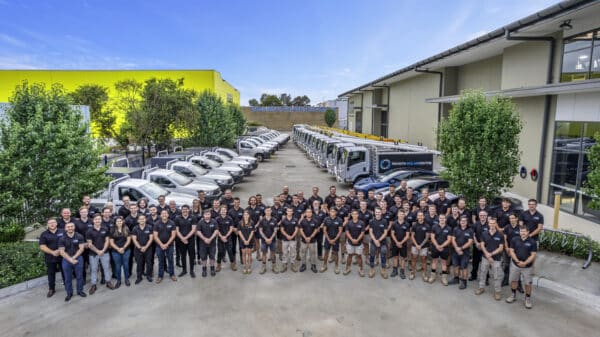
For more information about Enphase solar systems, you might want to check out the following article titled, How Much Does an Enphase IQ Battery 5P Cost?

